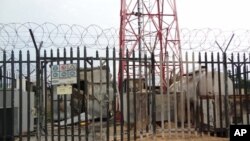ABUJA —
The Nigerian military says it killed 35 Islamist militants and arrested more than 150 in recent days in two northeastern states. The military says this is a sign it is overpowering the group known popularly as Boko Haram. But some analysts say battles will not be enough to eliminate the threat.
The military says the battle was "fierce'’ and lasted from early Sunday evening through the night.
In a phone conversation from Yobe State, on one of Nigeria’s notoriously bad phone lines, spokesperson Lieutenant Eli Lazarus said two soldiers were injured in the battle, and that the military recovered guns, ammunition, bombs, swords and even bows and arrows after the fight.
Lazarus said the raid was part of “Operation Restore Sanity,” which included the arrest of 156 suspected Boko Haram members in Adamawa State, also in Nigeria’s northeast. One suspect was also reportedly killed in that raid.
Lazarus said from a military perspective, this is a sign that the Nigerian government is beating Boko Haram, which has been blamed for roughly 1,400 deaths since it began attacks in 2009.
But some lawmakers, including Senator George Akume, say that from a social perspective, Nigeria’s mostly-Muslim northern states need development and jobs to eliminate the threat.
“Because of lack of power and collapse of industries you have a large group of unemployed people,” said Akume. "There are so many of them, in millions, doing nothing. It is so easy to recruit from this group.”
Boko Haram has not released a statement since the government announced the arrest and killing of a man known as Abu Qaqa, the Boko Haram spokesperson, last week.
Kabir Mato, director of the Institute for Anti-Corruption Studies at the University of Abuja, says the Boko Haram group formed in part as a response to extra-judicial killings, and Qaqa's alleged death is a part of a larger ongoing problem.
“If it were a sensible society and if it is true that the spokesman of Boko Haram was arrested and without a weapon in his possession and he was killed then there are more questions there than answers,” said Mato.
Boko Haram demands the imposition of Islamic law and freedom for imprisoned members, and has attacked churches, government buildings, security forces, schools, the media and individual government officials.
The United States has put three Boko Haram leaders on its list of foreign terrorists and analysts say the group is connected to other militant groups like al-Qaida and al-Shabab.
However, their only non-Nigerian target to date was last year’s bombing of the local United Nations headquarters.
Ardo Hazzard contributed to this report from Bauchi, Nigeria.
The military says the battle was "fierce'’ and lasted from early Sunday evening through the night.
In a phone conversation from Yobe State, on one of Nigeria’s notoriously bad phone lines, spokesperson Lieutenant Eli Lazarus said two soldiers were injured in the battle, and that the military recovered guns, ammunition, bombs, swords and even bows and arrows after the fight.
Lazarus said the raid was part of “Operation Restore Sanity,” which included the arrest of 156 suspected Boko Haram members in Adamawa State, also in Nigeria’s northeast. One suspect was also reportedly killed in that raid.
Lazarus said from a military perspective, this is a sign that the Nigerian government is beating Boko Haram, which has been blamed for roughly 1,400 deaths since it began attacks in 2009.
But some lawmakers, including Senator George Akume, say that from a social perspective, Nigeria’s mostly-Muslim northern states need development and jobs to eliminate the threat.
“Because of lack of power and collapse of industries you have a large group of unemployed people,” said Akume. "There are so many of them, in millions, doing nothing. It is so easy to recruit from this group.”
Boko Haram has not released a statement since the government announced the arrest and killing of a man known as Abu Qaqa, the Boko Haram spokesperson, last week.
Kabir Mato, director of the Institute for Anti-Corruption Studies at the University of Abuja, says the Boko Haram group formed in part as a response to extra-judicial killings, and Qaqa's alleged death is a part of a larger ongoing problem.
“If it were a sensible society and if it is true that the spokesman of Boko Haram was arrested and without a weapon in his possession and he was killed then there are more questions there than answers,” said Mato.
Boko Haram demands the imposition of Islamic law and freedom for imprisoned members, and has attacked churches, government buildings, security forces, schools, the media and individual government officials.
The United States has put three Boko Haram leaders on its list of foreign terrorists and analysts say the group is connected to other militant groups like al-Qaida and al-Shabab.
However, their only non-Nigerian target to date was last year’s bombing of the local United Nations headquarters.
Ardo Hazzard contributed to this report from Bauchi, Nigeria.





